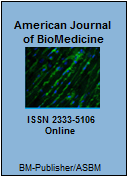Wafaa Sabri Mahood1* , ²Ibtisam Hammood Naserand AL Musawi, ¹Mohammed Mahdi Jawad
, ²Ibtisam Hammood Naserand AL Musawi, ¹Mohammed Mahdi Jawad
Abstract
PTEN gene is refer to Phosphatase and TENsin homolog deleted on chromosome 10 which is a tumor suppressor gene located at chromosome 10q23.31, encoding for protein that have both lipid and protein phosphatase activities. The essential function of PTEN is to block the PI3K pathway by dephosphorylating phosphatidylinositol (PI) 3,4,5-triphosphate to PI-4,5-bisphosphate thus neutralize PI3K function Genetic alterations of the genes related to PI3K/Akt pathway, including mutations of PI3K and PTEN, facilitate tumor genesis and are common in human cancers. The aim of this study is to assess a molecular analysis of PTEN gene in some colorectal Iraqi patients. Twenty two patients, 11 colorectal cancer and 11 with bowel inflammation from Iraqi patients were screened in exon 7 of PTEN gene using PCR and sequencing analysis. The results showed 23% (3 out of 22) patients were detected mutations. All 45% (10 out of 22) PTEN mutations in 3 colorectal patients were single base substitutions. In this study there are 60% (6 out of 10) transition mutations, 30 % (3out of 10) transversion mutations and 10% (1 out of 10) insertion mutation. In conclusion PTEN gene mutations may cause the etiology of CRC as there were genetic alterations in bowel inflammation and colorectal patients.
Keywords: PTEN; Colorectal cancer; PI3K
Copyright © 2019 by The American Society for BioMedicine and BM-Publisher, Inc.
References
- Chalhoub N, Baker SJ. PTEN and the PI3-kinase pathway in cancer. Annu Rev Pathol 2009;4:127-150.
- Steck PA, Pershouse MA, Jasser SA, et al. Identification of a candidate tumor suppressor gene, MMAC1, at chromosome 10q23. 3 that is mutated in multiple advanced cancers. Nat Genet 1997;15:356-364.
- Molinari F, Frattini M. Functions and Regulation of the PTEN Gene in Colorectal Cancer. Front Oncol 2013;3-326.
- Ding J, Gao Y, Liu R, Xu F, Liu H. Association of PTEN polymorphisms with susceptibility to hepatocellular carcinoma in a Han Chinese population. DNA Cell Biol 2011;30:229-234. .
- Goel A, Arnold CN, Niedzwiecki D, et al. Frequent inactivation of PTEN by promoter hypermethylation in microsatellite instability-high sporadic colorectal cancers. Cancer Res 2004;64:3014-21.
- Kafshdooz L, Kafshdooz T, Tabrizi1 AD, et al. Role of exon 7 PTEN Gene in Endometrial Carcinoma. Asian Pac J Cancer Prev 2015;16:4521-4524.
- Luo HU, Xu RH. Predictive and prognostic biomarkers with therapeutic targets in advanced colorectal cancer. World J Gastroenterol 2014;20:3858-3874.
- Naguib A, Cooke JC, Happerfield L, et al. Alterations in PTEN and PIK3CA in colorectal cancers in the EPIC Norfolk study: associations with clinic opathological and dietary factors. BMC Cancer 2011;11:123.
- Ali A, Saluja SS, Hajela K, Mishra PK, Rizvi MA. Mutational and expressional analyses of PTEN gene in colorectal cancer from northern india. Mol Carcinog 2014;53:E45-52.
- Han M, Wu G, Sun P, Nie J, Zhang J, Li Y. Association of genetic polymorphisms in PTEN and additional interaction with alcohol consumption and smoking on colorectal cancer in Chinese population. Int J Clin Exp Med 2015;8:21629-21634.
- Danielsen SA, Lind GE, Bjørnslett M, et al. Novel mutations of the suppressor gene PTEN in colorectal carcinomas stratified by microsatellite instability- and TP53 mutation- status. Hum Mutat 2008;29:E252-262.
- Phillips LS, Thompson CL, Merkulova A, Plummer SJ, Tucker TC, Casey G, Li L. No association between phosphatase and tensin homolog genetic polymorphisms and colon cancer. World J Gastroenterol 2009;15:3771-5.
- Lee J-O, Yang H, Georgescu M-M, et al. Crystal structure of the PTEN tumor suppressor: implications for phosphoinositide phosphatase activity and membrane association. Cell 1999;99:323-34.
- Zhang S and Yu D. PI (3) kingapart PTEN’s role in cancer. Clin Cancer Res 2010;16:4325-30.
- Sansal I, Sellers WR. The biology and clinical relevance of the PTEN tumor suppressor pathway. J Clin Oncol 2004;22:2954-63.
- Song MS, Salmena L, Pandolfi PP. The functions and regulation of the PTEN tumor suppressor. Nat Rev Mol Cell Biol 2012;13:283-96.
- Colakoglu T, Yildirim S, Kayaselcuk F, et al. Clinicopathological significance of PTEN loss and the phosphoinositide3-kinase/Akt pathway in sporadic colorectal neoplasms: is PTEN loss predictor of local recurrence? Am J Surg 2008;195:719-25.
- Day FL, Jorissen RN, Lipton L, et al. PIK3Ca and PTEN gene and exon-mutation-specific clinicopathologic and molecular associations in colorectal cancer. Clin Cancer Res 2013;19:3285-96.
- Lin L, Zhang Z, Zhang W, Wang L, Wang J. Roles of genetic variants in the PI3K/PTEN pathways in susceptibility to colorectal carcinoma and clinical outcomes treated with FOLFOX regimen. Int J Clin Exp Pathol 2015;1:13314-22.
- Puerta-García E, Cañadas-Garre M, Calleja-Hernández MÁ. Molecular biomarkers in colorectal carcinoma. Pharmacogenomics 2015;16:1189-222.
- Guanti G, Resta N, Simone C, et al. Involvement of PTEN mutations in the genetic pathways of colorectal cancerogenesis. Hum Mol Genet 2000;9:283-7.
- Shin KH, Park YJ, Park JG. PTEN gene mutations in colorectal cancers displaying microsatellite instability. Cancer Lett 2001;174:189-94.
Thank you for visiting American Journal of BioMedicine. * = Required fields
Error: Contact form not found.
How to cite this article
Mahood W, AL Musawi I, Jawad M. Molecular analysis of PTEN gene in some Iraqi colorectal cancer patients. American Journal of BioMedicine 2019;7(3):171-179.






